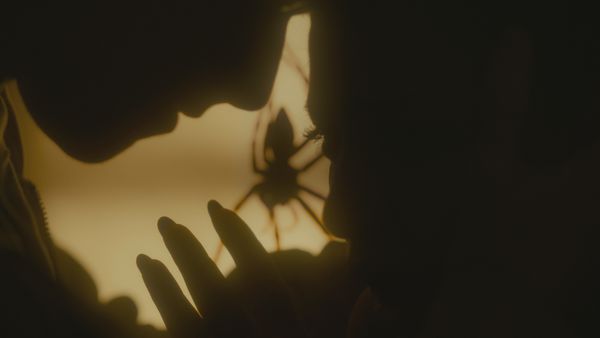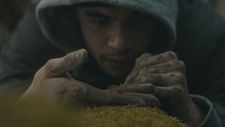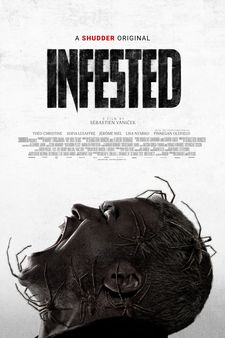 |
| Sébastien Vanícek’s Infested Photo: courtesy of Shudder. A Shudder release. |
Arachnophobia is a common fear, and there have been a few films made about killer spiders, but only one has screened at Venice. Sébastien Vanicek, director of Infested (aka Vermines), was as surprised as anyone when it happened, but he’s even more excited that his film is being released around the world. It’s a beautifully made film with strong characters and an intelligent subtext. It’s also his first feature, and he’s passionate about his craft – something which came across clearly when we met to discuss it.
“I have a background of 15 years of short movies with my friends,” he says, ”without money or anything, with a lot of ideas and things I wanted to say and wanted to show, but with always the same goal in mind, which was doing something really intense, an interesting experience for the body and for the mind. I have always done these type of movies.
“When Harry [Tordjman], the producer, asked me what would be a good idea for my first feature, I immediately thought about a horror movie with people trapped in a building with spiders, because I wanted to talk about suburbans from the suburbs of France. Suburbs in France have a really bad reputation, and people who come from the suburbs have a bad reputation because it's like a bad neighbourhood, like in the US.
“People are judged for where they come from. And I think it's a perfect parallel with spiders, which are creatures that are judged for their look, for their shape. You don't try to understand, and you know that they are not dangerous, but you immediately want to kill it or you want it out of your living room. And it's kind of the same thing with suburbans. You don't want to have them in your neighborhood. So I had the perfect parallel between my characters and monster, and I put my will to do an intense movie for the body, something that's really for the senses. I put it everything in a shaker, and I shook it, and I started to write.”
 |
| Kaleb with the spider Photo: courtesy of Shudder. A Shudder release. |
Race is not a big issue in the film, he says, and some critics have attached too much importance to it. His cast is diverse in terms of racial backgrounds simply because that’s what life in the suburbs is like, but when that’s where one lives, one will still face discrimination if white. “But when you see suburbs in France, that's where we put the minorities. So obviously we have more Black people and Arabic people and, like me, people from Eastern Europe in the suburbs because they are immigrants, they have less money, so they are able to live here. But, you know, now you can see them in Paris, in big cities.
“But the fact that the spiders are taken from their homeland in the desert, it's obviously homage to these people who were taken from their homeland to build these buildings in France, and were trapped in these buildings. When they had their apartments, we told them ‘Okay, now you don't move anymore. You will stay here and you will die here.’”
I tell him that the first thing that stood out to me about the film when I was watching it was the photography at the start when people are looking for spiders in the desert, and the way that they walk through the sand and the sand is kicked up, which tells us straight away that there's something down there in it. I don’t think I've ever seen sand shot like that before, that kind of walking. Did he come up with that shot, or was that his cinematographer?
“I came up with pretty much all the shots because I storyboard. I storyboarded all the movie because I draw a lot. It was really important to me to have these scales. You know, you have a really wide shot, and you are getting really close to the ground, and you have the point of view of the spiders. Because I wanted people to understand that spiders are also victims in this movie. They are taken from their homeland, and I needed the camera to go on the floor and to show their point of view. So that's why I came up with this idea.”
There are lots of different potentially dangerous animals in the film. How did he manage all of them on set?
“It's the subject of the movie. They are judged like they are dangerous, but they are dangerous just because they want to be defend themselves when they are attacked or they are in danger. If they are not in danger, you are not in danger. They won't do anything. So I just worked with people who love animals and who love this most creature, and I have the same fascination for creature. So were sharing the same love for them, and were really careful with them.
“We were really protective with them. We shot with real animals who were really quiet. It was really intense on the set, you know, in order for them not to be afraid. And I think that everything that we did, not to hurt them, they understood it and they gave it back, and so that's why I had so many nice shots with real spiders and other insects.””
There is a moment when the spider is first introduced to the room and all the other animals go still and quiet. Did he have to wait for each one to go quiet and film those bits separately, or did he do something to make them go like that?
“I just put a camera in front of them and let them live,” he says. “I was lucky enough to have this shot of this insect going under a rock or escaping, and it was just luck, I think.”
 |
| Suburban living in Infested Photo: courtesy of Shudder. A Shudder release. |
When we first meet the hero, Kaleb (Théo Christine), he’s involved in petty theft, and later he’s quite aggressive to some bodys in his building. Was it important that we get a troubling first impression?
“Yeah, it was important to have a first impression where you say ‘I don't like this guy. He has a bad reputation.’ It's how you treat suburbans. I don't like this way of addressing suburbans, this kind of speaking. But you immediately understand that he's like his creature. He's really fragile when he's in his room. You understand that he's an orphan. He just lost his mother. He's all alone because his sister wants to leave, wants to sell the apartment. So he feels like he's abandoned by everybody, all the people that he loves. So he has like a protective point of view. He's becoming aggressive in order to protect himself. And that's when you understand that he's still a child, that you will be able to have some compassion for him. And this movie is also a coming of age one.”
We subsequently learn that Kaleb has a real affection for the spider he’s bought.
“Yeah. Kaleb is into animals. He loves them, but he doesn't know how to love them. Because when you love someone or something, you don't put it in a box. But he will have to realise it. He will have to understand it, that you have to let them live their life. And you will still be able to love them or they will still be able to love you back.
“He will understand that they are dangerous because they are trapped in the building with them. He will have to understand that they are not an enemy, that spiders just have to survive. They are brothers and sisters and they are in the same condition. The only thing that he's done is that he puts the spiders in this building. So he's responsible for that. He didn't have to do that. And it's not a thing to do, to put a spider, which doesn't belong in this building, in this building. And at the end of the movie, he has understood that the spiders are not dangerous and they're just afraid and they just want to leave.”
The film also addresses the living conditions that people face there, because even before the spiders, the building isn't in a great state of repair. I mention that I lived in places like that when I had no money, but a lot of people who go to see the film probably won't be familiar with things being that bad.
“Yeah. It's the government who is in charge of these buildings, so when there is a problem, it's the government who will have to deal with the problem. And the government always deal with the problem in the same way. It will look another way and will leave the building how it is.
“There are a lot of problems in these buildings and people have to take care of these problems. Kaleb is a guy who is like, ‘We live in this building so we have to take care of it. So I don't want firecrackers. We have to help each other. We live together and the ship is sinking and we have to help each other in order to survive.’ And I think that's really interesting in this building.
“I grew up in one of these buildings. The thing is that we know each other. It's not like we love each other, but we grew up with each other. So, you know, I was able to go to my neighbour's apartment when my mother was not here. As soon as you see someone with grocery bags, you help this person to take these groceries. And I think it's something that doesn't exist in big cities. It's something we have in the suburbs, and I wanted to show a good point of view on suburbs.”
We talk about the way that people die in the film, and the lack of sensationalism.
 |
| Infested poster Photo: courtesy of Shudder. A Shudder release. |
“Yeah, it was realistic. Even though you can't die from a spider. Even if it's a black widow, you won't die. The only people who die from spider bites are people who are allergic to these bites. So it's always sci-fi when a spider kills someone. But I just took what spiders do to insects or to their prey when they kill it, and I make it bigger in order for humans to be threatened by spiders. And, yeah, I didn't want to have a blood or things like that in this movie. I wanted the fear to come from the spiders. And not what they do, just the animal – because the subject of the movie is you are afraid of something you don't know.
“You don't like the shape and you don't like the behavior. That's the parallel between suburbans and spiders. And I didn't want people to be afraid of, ‘Oh, when it bites you have your neck like this and it explodes in your brain.’ I want people to be afraid of spiders and then when you see the movie another time and you see it through the spider point of view, you understand that they are victims. You understand that they act when they have to defend themselves from an aggressor.”
When it came to casting, chemistry was key.
“I saw a lot of people and worked with them. The problem was not if you are a good actor, the problem is, are you able to work with me? Am I able to work with you? Does your relation work with this actor? And I tried a lot of combinations of actors and I had Theo, who is Kaleb, from basically the beginning. So I tried different actresses with him and with Lisa, who plays Manon, the chemistry came really fast because they have this brother/sister relationship. You know, they love each other, but they don't say it. They always say something bad to the other. And I immediately felt this chemistry.
“So it was not about how good you are, it was how the chemistry worked. How are you on the set? And obviously I needed people who are able to go really far in the movie. You know, they needed a lot of energy. They needed to put everything in this movie in order to have this tension and for the people to be really close to these characters.”
When we’re talking, the film has just played at the Overlook Film Festival. He explains that he wasn’t able to go, but he will get to see it when it opens in London.
“The festival journey started with Venice. It was kind of a big surprise for me for a French horror movie to go to Venice. It was really important, really intense. And after that we had Sitges and then Fantastic Fest and we had a lot of festivals and prizes everywhere. It was really nice. And this trip ended with the Césars in Paris.
“I would never imagine that this movie, my first feature would be in the Césars because in France you have to be an auteur or something like that. For a genre film to be there, it's amazing, but yeah, it's cool. But the main interest for me, the main goal for this movie is to please the audience, you know? It's always about the audience. So I would prefer to have thousands of people in the theatre than festivals. I want people to have fun in the theatre. That's all I want, okay?”





















